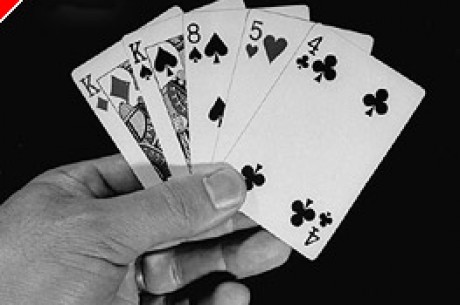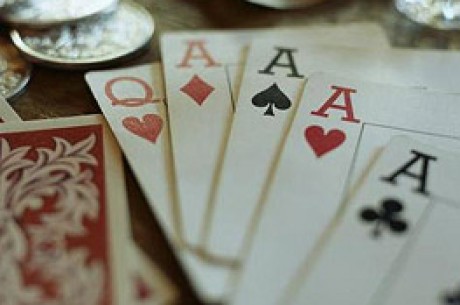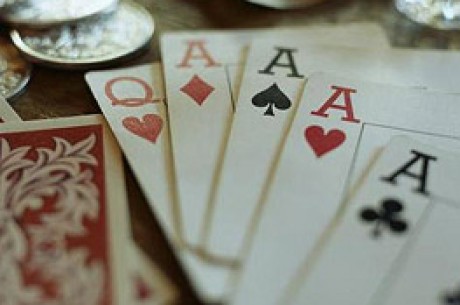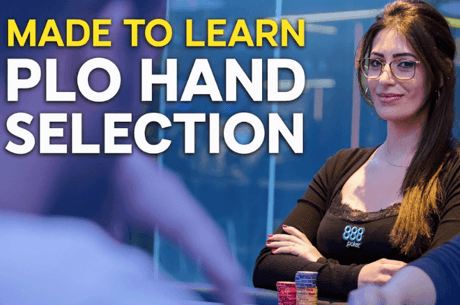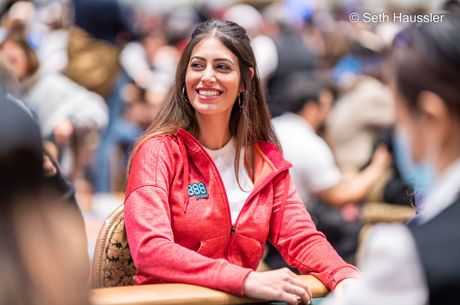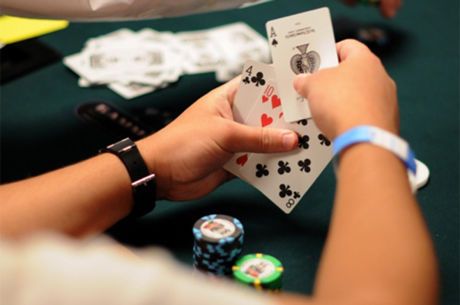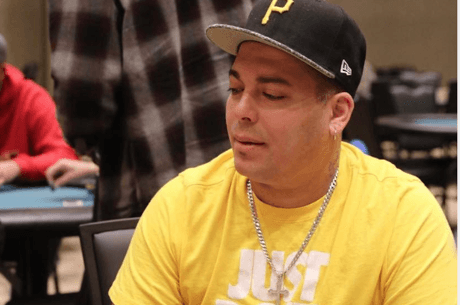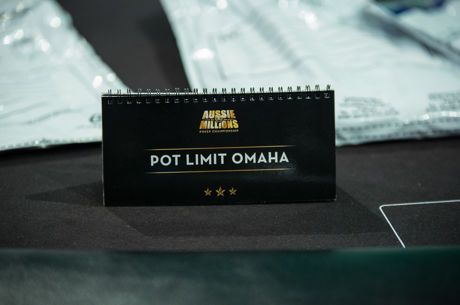Introduction to Omaha Part XI - Revision and Practice # 2
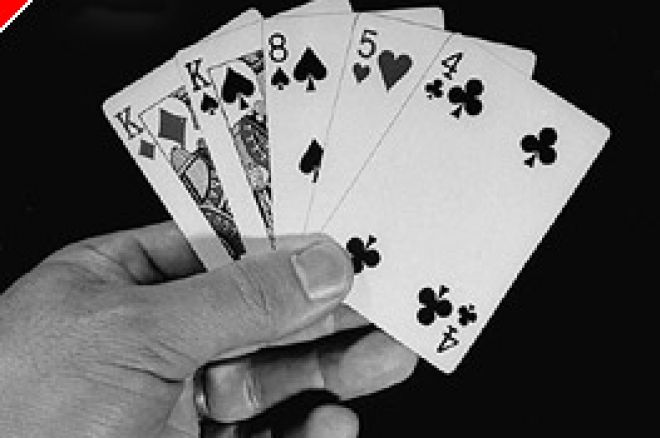
Tony is a regular on-line player living in England. He mostly plays Texas Hold'em and Omaha (High and Split) at fixed, pot and no limit, at both cash and tournament tables. Tony says: "I often play lower stakes games because there is money to be made without excessive risk to your bankroll. Many players I come up against at these levels are not schooled in poker strategy and the truth is they are giving away money, either through ignorance of strategy or misplaced aggression. If you have a limited bankroll, you should be conservative and choosy but the pickings are there. These articles are written to prevent you becoming one of the hunted."
Introduction
Last time out, I decided to record the hands of an on-line game of Omaha High at a low level limit table ($0.50/$1) to test out the points of strategy I have been discussing and observe how hands develop in practice. Due to space restraints, I was only halfway through a short session. The cards had not been very inspiring so I had folded most of them before the flop. Even so, two pots were won and that left me with a $5 profit after 19 hands. This week, I finish off the session.
Better Cards Please Dealer!
I am in the midst of a Party Poker online game of Omaha High $0.5/$1 fixed limit on a table of 10 players. Patience is the name of the game because you will not win money paying to see the flop with your four random cards every time.
After 19 hands, my $100 has become $105. Had I started with $30, it would now be $35. That seems a better percentage increase but the profit is $5 whichever way you cut it. The size of your stack is not critical at the fixed limit poker table, unlike pot or no limit games.
Hand 20: I am dealt 9h Qd Kc 8h. There is some potential for straights but reliance on a J and T. There is also a suited connector. I call hoping to see a cheap flop. Flop is Ac 5h 7h. That gives me a gutshot straight flush draw but any other heart would only give me a weak flush, so I have to go easy. There isn't truthfully a lot to go with here, so I call. The turn is Kh giving me a flush. I can still lose to anyone holding two hearts one of which is Th, Jh, Qh or Ah (unless the 6h hits the river!). An early position has bet ahead of me, which sounds ominous, but I call. We are heads up and the river comes 6c. That makes my straight but that is no help now. My opponent bets out confidently and I call. Indeed he shows the Ah and two other hearts. I could have laid it down but for an additional $1 I was happy to ensure that my friend was not betting with two little cards. This is where limit Omaha differs so much from Pot Limit. I would have no difficulty laying down the cards, probably at the turn, if a pot bet came. The value of the bet is crucial.
Hand 21: 2h 8s 4h Kd. That's folding material.
Hand 22: Early position 9d Jd 2h Ac. A sliver of potential but the 2h is a "dangler" with no merit which narrows my possibilities. Fold.
This is a good time for reflection! After I folded this hand, the flop came Td 4h 3c which would have given only a marginal improvement. The turn was 8d and the river 7d. Would you believe that? I would have made a straight flush! This is the sort of thing that inspires players to see a flop and keeping betting the hope cards. The odds of a hand like this are astronomical so don't keep digging for one because, like the gold prospectors of old, you will end up as the poker equivalent of a skeleton slumped over your shovel. Let's move on and forget it.
Hand 23: 8c 7d 2d 4s. Fold.
Hand 24: Under the gun. Jd Ts As Th. A nice looking hand here. I decide to raise under the gun and hopefully remove some drawing hands from the fray before the flop is revealed. I still get five callers so the pot is already at $6. The flop comes 6h 7d 9c. Not the best one as I now need an 8 to make a straight but I do hold a moderate overpair. I bet it out and get two callers followed by a raise. That is also called before me so I decide to play safe and fold. My odds are not good despite the pot as it is likely that someone has made a straight already. The turn came a 4d and the river 2s. I would have been high and dry had I stuck around. The first raiser took the pot down uncontested.
Hand 25: Big blind. Qc 7c 5h Kd. This is a fold if there is a raise. It is flat-called by seven players so I check. Flop 4c 9h 7s. I check and so does everyone else, so I get another free card. The turn is 2c, giving me a Q high flush draw. I again check and this time there are two callers. The pot is $6 and it will cost me $1 to see the river. It is probably worthwhile. The river comes 5s making me a weak 2-pair. I do not like it because there are plenty of ways for someone to have made a straight on a board of 97542. I check and one person bets. I decide to keep him honest for $1 and he reveals 86 for the nut 9-high straight.
Hand 26: Small blind. Kc Jd Jh 2s. Once again I have all four suits and a dangling 2 to detract from an otherwise half-decent hand. I probably should fold but I am getting a cheap look at half a bet being in the small blind so long as there are no raises. I need a good flop being in the disadvantageous first betting position. The flop comes 3h 7s 4c. No help so I check and the next man bets out. I fold. The turn produced a 2 and the showdown revealed a 6 high straight beating a 5-high straight. This again demonstrates that you must always fear the nuts in Omaha.
Hand 27: On the button but I get As Qd 2h 7c. Fold.
Hand 28: 8c 7s 2s As. Three spades in my hand is not a good thing when the nut flush is my only reason for staying. Despite this, I decide to see a flop as I am in good position in the cutoff (just behind the button). Flop is Td Ad 6s which gives me top pair, a gutshot draw for a straight and a possible back door nut flush. Checked round to me so I bet out $0.50. The button and four other callers. Turn is 7d. That could make someone a flush but also hands me a 2-pair, aces up, with four outs for the full house. Checked all round so maybe no flush. River Qc and someone bets. Possible nut straight but I decide to keep him honest for $1. He did indeed hold KJ.
Hand 29: 3h 3s 2c 9d. More junk. Fold.
Hand 30: 6d 6s 8c Jd. Nothing worthy so fold.
Hand 31: Ac Kh 2d 2c. There are nut flush and straight starting cards but only a low pair apart from that. I decide AK is not enough reason to stay as I need to see lots of high cards or clubs on the flop to continue. A tight fold. I am justified when the flop comes 5d 5s Td. It was won by someone making quad 5's!
Hand 32: Tc 7d 2c 2s. Rubbish and folded.
Hand 33: 5d 6c 9d 4c. A little straight potential but a bit wispy with a gap at the high end which is bad news. It is double suited for a weak flush back-up but if an 8 7 were to come down and help make a straight, I would be at the mercy of higher straights. I am also in early position so I decide to fold. Of course the flop comes down 7c 8c 2h! That is a draw for many straights and flushes including a possible straight flush. In the event, 2c 2d completed the board and I would have been beaten by both a higher flush and a full house.
Hand 34: 6d 8c 2s Kh. Fold.
Hand 35: Big blind. 2d 9d 7d Ac. I check the flat calls. Flop is Jd 6c 3d for a modest flush draw but little else of note. One diamond is already dead in my hand and I would probably be a dog if someone else holds two diamonds. I check and there are three bets, but I decide to call at the cheap level of $0.50. The turn is 6d for the flush but it also pairs the board which is a danger. I check and the first bettor bets again. This seems ominous as he is not afraid of the diamonds. Another call comes in so I decide to fold. The Ts completes the board and the first bettor shows down a pair of J's for the nut full house.
Hand 36: Small blind. Jc Ac Ad 9h. This is a bit more like it! AA is always welcome but I like to see support too. Here we have a suited ace and nut straight possibility. The 9 is a little bit dangly but it could help the J to a lower straight. Flat calls ahead of me so I raise those to $1. From now on I will be first to bet so I want to be sure of my hand and eliminate limpers from the equation. However, six players call me to swell the pot so I want some good cards now. Flop comes 2c 5d 6c giving me a nut flush draw. I probably should bet but decide to check, expecting a bet somewhere. But it is checked all round. Turn is 3c completing my nut flush. Hopefully, it has made someone a flush or a straight but I do not want to see the board pair on the river. I check looking for action. But no, it is checked and the river is 4d. I bet out knowing I have won unless someone holds 5c 4c for the straight flush! One person raises behind me, the rest fold. I re-raise and he calls. I am safe as he hasn't re-raised. I take down the pot of $12.25. I probably should have bet on the flop or turn and dragged in some value but, hey, hindsight is a wonderful thing!
I call it a day here and I am a massive $2.75 to the good! Well, it's a profit.
Conclusion
This has been a good exercise in discipline. My cards were poor overall and I got little help from the few flops I saw. The lesson is that you must be hard on yourself about seeing flops and more when the cards offer a small likelihood of success. Hopefully, the hands I have played demonstrate the problems you have to think about every time you play Omaha. It is very different to Texas Hold'em because it is so much easier in Omaha to envisage yourself making a good hand and staying in the pot. The corollary is that your opponents are offered the same opportunities. Keep it all in proportion and do not over-value your hand.
During the playing of these hands when the table was full, almost every round saw six, seven or eight players paying to see the flop. They will all happily flat-call. Some will fold to a raise but for many, the cost of seeing a flop is like a compulsory ante. Always avoid taking that attitude. Don't pay more in "antes" than you have to. Wait for the point of maximum opportunity, when your hole cards offer up several options for hand completion. When that happens, you will have a nice pot to fire at.
Next week, I will play a session of Omaha Hi/Lo Split and visit the problems of that version.
Exorcism
16 June 2005
Ed Note: Great Omaha action at Paradise Poker. Get a piece of it.

